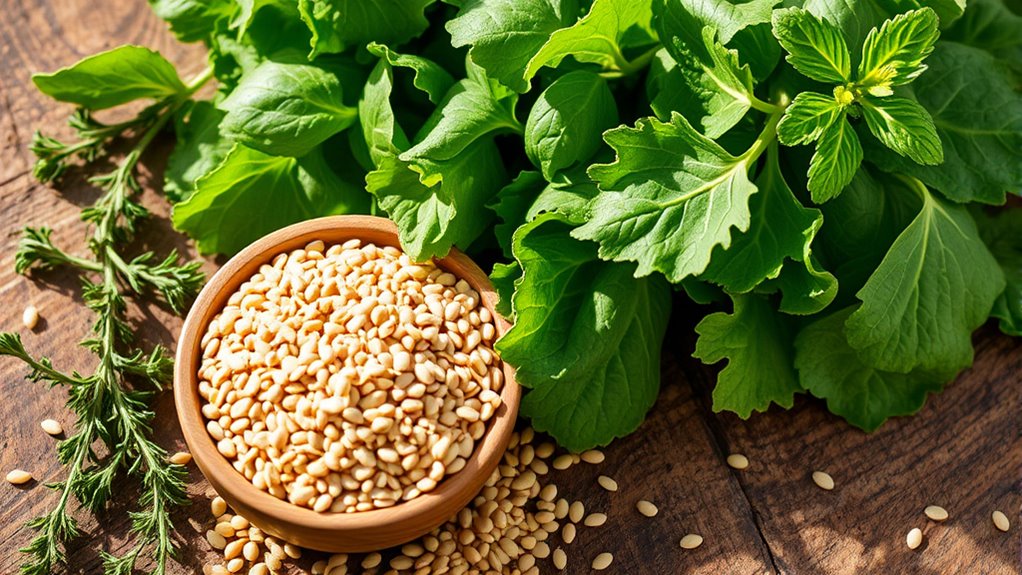To boost your calcium intake plant-based, incorporate nutrient-rich seeds like chia, sesame, and flaxseeds into your meals. Add dark leafy greens such as kale, collard greens, and bok choy for a calcium punch, but watch out for oxalates that can interfere with absorption. Herbs like parsley and herbal teas like nettle also contribute small amounts. Keep exploring different combinations and tasty ways to include these in your diet to support strong bones.
Key Takeaways
- Seeds like chia, sesame, and flaxseeds are rich plant-based sources of calcium, easily added to meals.
- Leafy greens such as collard greens, kale, and bok choy provide significant calcium, especially when prepared properly.
- Herbs like parsley and thyme contribute small but beneficial amounts of calcium when used in cooking.
- Combining seeds, greens, and herbs enhances overall calcium intake and bioavailability.
- Fortified plant-based milks and beverages are convenient ways to boost calcium consumption from plant sources.
Nutrient-Rich Seeds for Bone Health
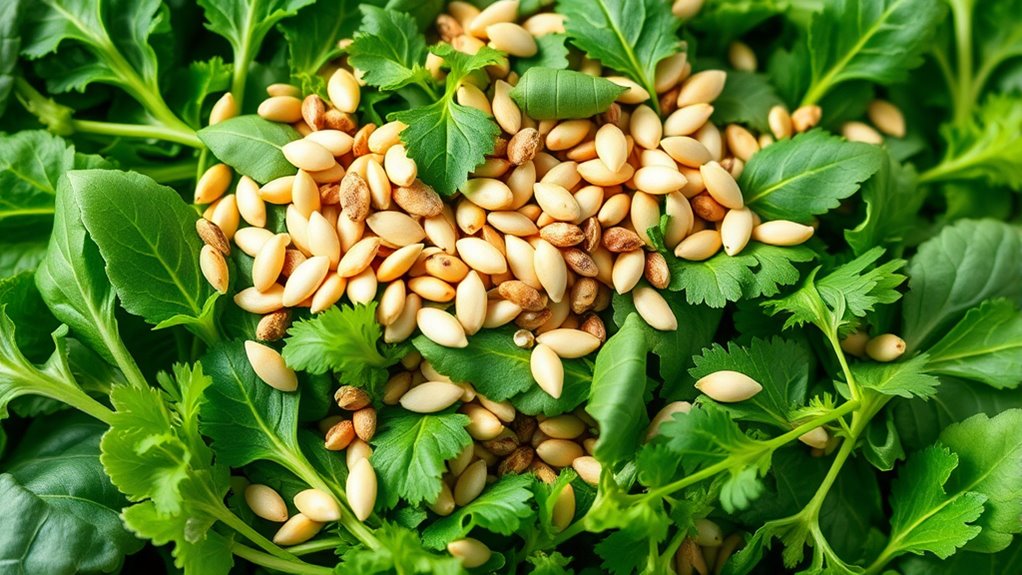
Nutrient-rich seeds are an excellent plant-based source of calcium that can support your bone health. These seeds, such as chia, sesame, and flaxseeds, are packed with calcium, making them ideal plant-based supplements. To maximize calcium absorption, it’s important to consume seeds with vitamin D-rich foods or supplements, as vitamin D enhances calcium uptake in your body. Incorporating seeds into your diet is simple—you can sprinkle them on oatmeal, blend them into smoothies, or add them to salads. Since seeds provide a concentrated source of calcium, they’re a convenient way to boost your intake without relying on animal products. Regularly including nutrient-dense seeds helps ensure your bones stay strong and healthy over time.
Leafy Greens That Pack a Calcium Punch
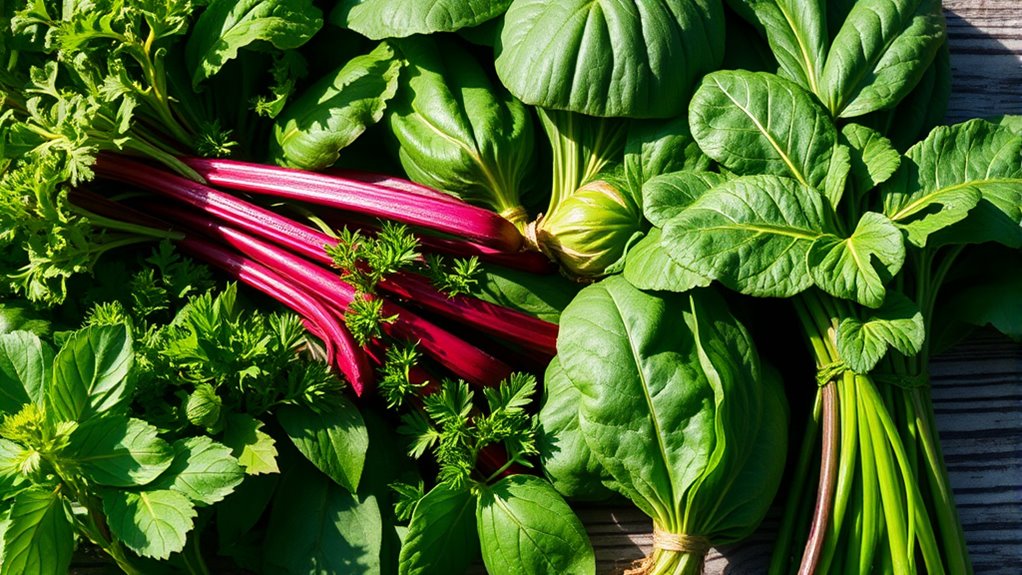
Leafy greens are some of the best plant-based sources of calcium, providing a nutritious way to support your bone health. However, calcium absorption factors can vary based on soil mineral content, which influences nutrient levels in greens. Darker greens like collard greens, kale, and bok choy tend to have higher calcium content. Keep in mind that oxalates in some greens, like spinach, can inhibit calcium absorption despite their high levels. To maximize your intake, choose greens with lower oxalate levels or prepare them properly. Here’s a quick comparison:
| Green | Calcium Content (per 100g) | Oxalate Levels |
|---|---|---|
| Kale | 150 mg | Low |
| Collard Greens | 180 mg | Moderate |
| Spinach | 99 mg | High |
Understanding soil mineral content helps predict calcium availability in your greens. Soil mineral content can significantly influence the nutrient levels in your greens, affecting how much calcium your body can absorb.
Herbal Options to Boost Your Calcium Intake
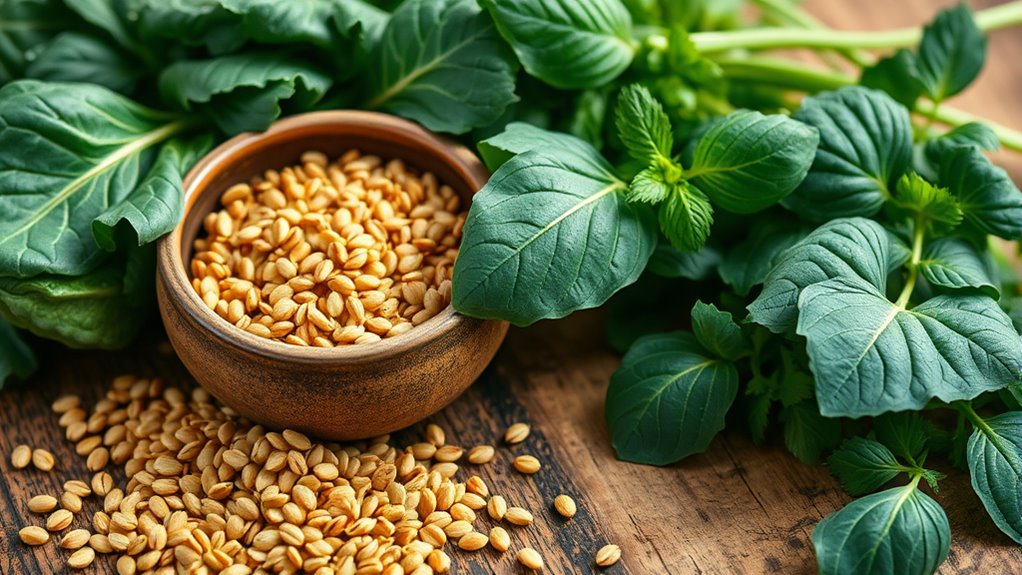
If you’re looking to increase your calcium intake through herbs, several options can help you achieve that goal naturally. Herbal teas for calcium are a tasty way to support your bones, with varieties like nettle or alfalfa tea providing small amounts of calcium. Additionally, herbal supplements to enhance absorption, such as vitamin D-rich herbs like echinacea, can improve how your body utilizes calcium from other sources. Incorporating herbs like parsley or thyme in your cooking can also contribute to your calcium intake, while the use of filtration technologies in air purifiers demonstrates how modern solutions can improve indoor environments, much like choosing the right herbs can enhance your health naturally. These options offer a natural, simple way to support your calcium levels without relying solely on dietary sources, and understanding creative practice can inspire innovative ways to incorporate these herbs into your daily routine. Incorporating herbal supplementation methods can further optimize calcium absorption and overall bone health, especially when combined with other nutritional strategies to maximize benefits. Exploring indoor gardening with unique planters can also be a creative way to grow fresh herbs at home, enhancing both your environment and your diet.
Combining Plant-Based Sources for Maximum Benefit
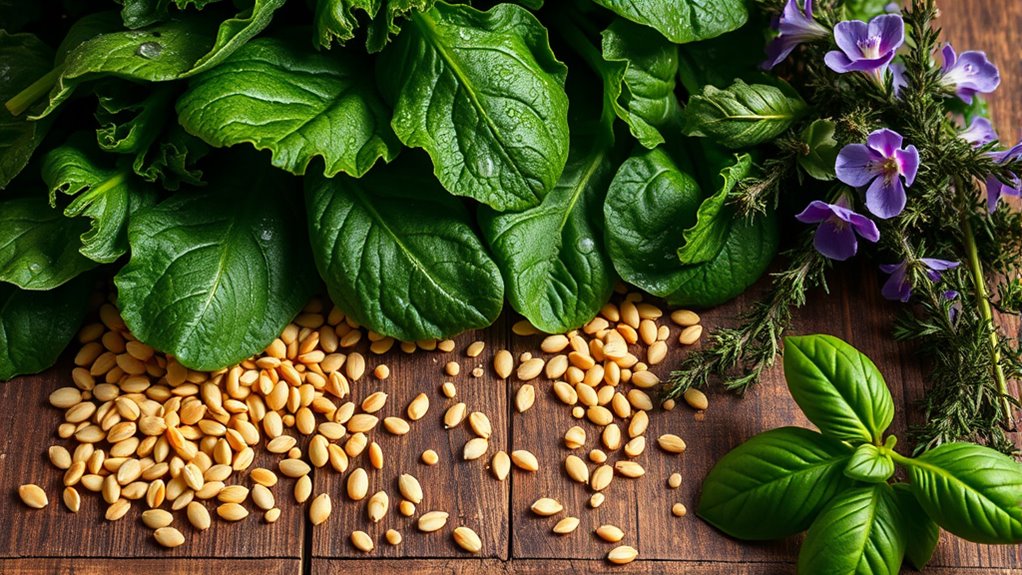
Combining various plant-based calcium sources can substantially enhance your overall intake and absorption. To maximize benefits, consider fortification methods that add calcium to foods and pairing calcium-rich plants with absorption enhancers like vitamin C-rich greens or herbs. This strategy improves bioavailability and helps you meet daily needs. Additionally, understanding Data Privacy Challenges is crucial when selecting fortified or processed foods to ensure your personal information remains protected. Incorporating plant-specific nutrients can further support your calcium absorption and overall bone health. Being aware of bioavailability factors can help optimize how effectively your body utilizes calcium from these sources, especially considering wall organization techniques that keep your dietary space organized and accessible. Recognizing the role of absorption enhancers such as vitamin C-rich greens or herbs can significantly improve calcium uptake from plant-based sources.
Tips for Incorporating Calcium-Rich Plants Into Your Diet

Incorporating calcium-rich plants into your diet can be simple and enjoyable when you have practical strategies. First, swap dairy with dairy alternatives like fortified plant-based milks, which often contain added calcium. Second, add greens such as kale or bok choy to your meals; they’re versatile and nutrient-dense. Third, choose fortified beverages like plant-based yogurts or juices that boost your calcium intake effortlessly. Incorporate these options into your daily routine—pour fortified milk over cereal, blend greens into smoothies, or enjoy fortified beverages as snacks. By making small, consistent changes, you’ll enhance your calcium intake naturally while enjoying a variety of plant-based flavors. These tips help you stay healthy without relying on traditional dairy products. Community engagement can also inspire new ideas and motivate you to explore different calcium-rich plants, especially considering the personality traits that influence your food choices and habits. Additionally, creating a dedicated space for meal planning or cooking can support your consistency and remote work productivity, making it easier to adopt new dietary habits. Engaging in research on plant-based nutrition can further help you identify other effective calcium sources to diversify your diet, including plant-based calcium sources such as seeds, greens, and herbs.
Frequently Asked Questions
Are Plant-Based Calcium Sources Suitable for People With Osteoporosis?
Yes, plant-based calcium sources are suitable if you have osteoporosis, but consider their bioavailability. While they may contain calcium, the absorption rate can be lower than dairy. To boost your intake, include calcium-rich herbal remedies and greens in your diet. Combining these with vitamin D and weight-bearing exercise can help improve bone health. Always consult your doctor for personalized advice on managing osteoporosis with plant-based calcium.
How Does Calcium Absorption From Plants Compare to Dairy?
Calcium absorption from plants is generally lower than dairy due to bioavailability differences, meaning your body doesn’t absorb plant calcium as efficiently. However, you can improve absorption by consuming foods rich in absorption enhancers like vitamin C or pairing calcium-rich greens with healthy fats. While dairy provides highly bioavailable calcium, incorporating plant sources with these enhancers helps boost your calcium uptake, supporting bone health effectively.
Can Vegans Meet Daily Calcium Needs Without Supplements?
Think of your calcium intake like a garden needing diverse plants. You can meet your daily calcium needs without supplements by eating a variety of plant calcium sources like greens, seeds, and herbs, which offer good calcium bioavailability. While some plant calcium varieties have lower absorption rates, combining them with vitamin D-rich foods helps maximize absorption. With careful planning, you can naturally nourish your bones without relying on supplements.
Are There Any Side Effects From Consuming High-Calcium Plant Foods?
Yes, consuming too much calcium from plant foods can lead to calcium overdose, causing side effects like kidney stones or mineral imbalance. If you regularly eat high-calcium greens, seeds, or herbs in large amounts, you might experience nausea, constipation, or interfere with other mineral absorption. Moderation is key—balance your diet to avoid mineral imbalance and make sure you get nutrients without risking calcium overdose.
Which Plant-Based Calcium Sources Are Best for Children and Pregnant Women?
Think of your child’s and pregnant woman’s calcium needs as a garden needing the sun and rain. Leafy greens like kale and collards, along with sesame seeds, shine brightly as excellent sources, promoting calcium absorption and nutrient synergy. These foods not only nourish bones but also support overall health. Choose diverse, colorful plant foods to guarantee ideal calcium intake, making their health bloom like a vibrant garden in full bloom.
Conclusion
By exploring seeds, greens, and herbs, you can easily boost your calcium intake naturally. Think of these plant-based sources as treasures buried in your kitchen, waiting to be uncovered. Incorporate them regularly, and you’ll strengthen your bones like a sturdy tree rooted deeply in the earth. Embracing these options not only supports your health but also makes your diet vibrant and diverse. Start today—your bones will thank you like a grateful friend.

